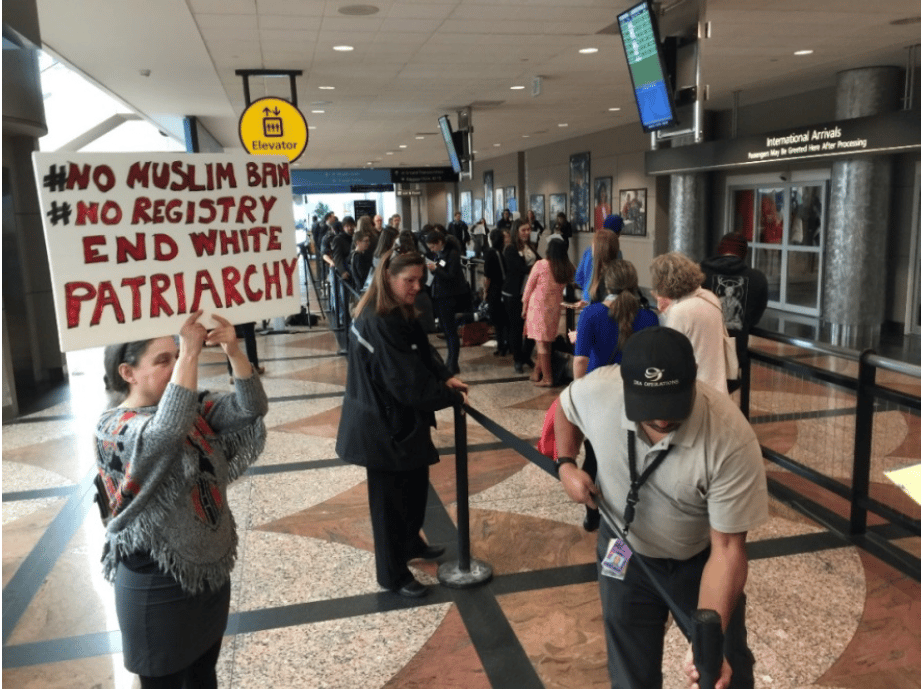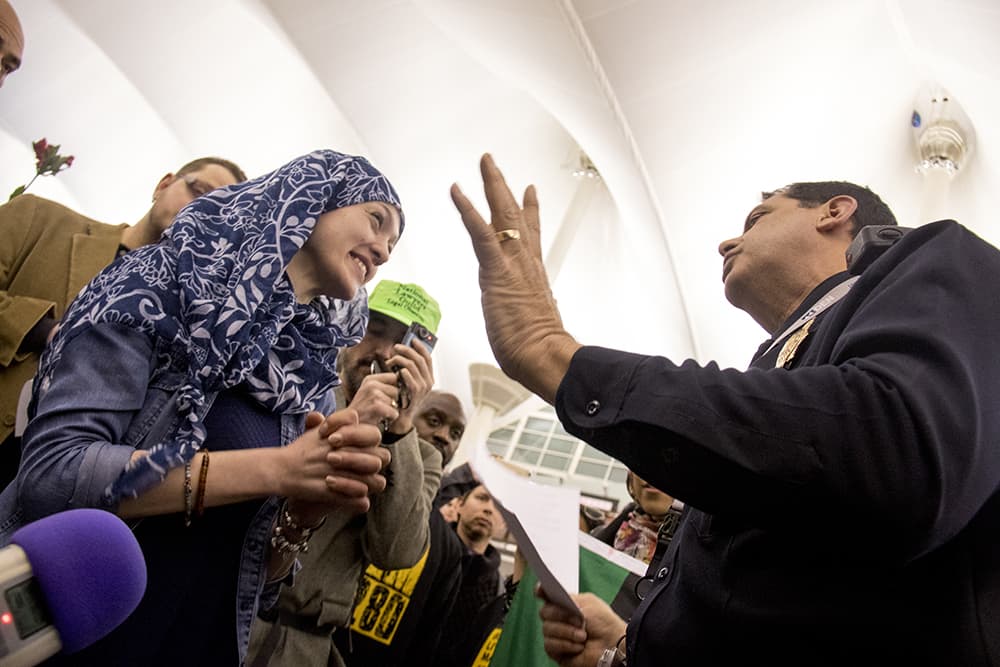
Two people are suing Denver's government and two police officials, claiming that they were wrongfully threatened with arrest for holding signs at Denver International Airport.
The lawsuit, filed in federal court today on behalf of Eric Verlo and Nazli McDonnell, comes out of a weekend of protest that brought tens of thousands of people and teams of attorneys to airports around the country, including a sizable crowd at DIA.
The protests came just after President Donald Trump issued an executive order permanently barring Syrian refugees and temporarily barring residents of seven predominantly Muslim countries from entering the United States.
That Saturday, Commander Tony Lopez of the Denver Police Department had informed protesters that they could be arrested for violating the airport's rules, according to the plaintiffs' filings. Lopez told Amal Kassir that "anything that could be construed as free speech," was prohibited without a permit, as shown in a video provided by attorneys for the plaintiffs.
Earlier, the commander had asked protesters to stop chanting in an apparent attempt to find a middle ground, according to Denverite's video from the scene.
Lopez reportedly said that the rules applied to all 50 square miles of airport property, suggesting the protest move six miles away to Tower Road, or farther. Protesters verbally asked for a permit but had not formally applied for a permit for either the Saturday or Sunday gatherings, according to an airport spokesman.
The plaintiffs, Verlo and McDonnell, went to the airport on Sunday, the day after the larger protest, and silently held signs in the main concourse reading “#No Registry," "#No Muslim Ban," "End White Patriarchy and "Muslims Welcome." They stood near the Customs and Border Protection screening area where international travelers exit the secure area.
After some time, Sergeant Virginia Quinones approached the two plaintiffs and told them they'd be arrested if they didn't leave Jeppesen Terminal, according to the lawsuit. She reportedly said that they would need a permit to hold their signs silently.
No one was arrested over the weekend of protests, but the plaintiffs were "startled by Sergeant Quinones’ threat and feared arrest for the duration of the time they were there," the filing states. Quinones, Lopez and the city itself are the defendants in the lawsuit.
The plaintiffs' attorney, Andy McNulty, argues that the rules are so broad they could apply to practically any speech.
Here's what the rules actually say, emphasis mine:
"No person or organization shall leaflet, conduct surveys, display signs, gather signatures, solicit funds, or engage in other speech related activity at Denver International Airport for religious, charitable, or political purposes, or in connection with a labor dispute, except pursuant to, and in compliance with, a permit for such activity issued by the CEO or his or her designee."
McNulty gave me this example: "Wearing a hat that says Make America Great Again is free-speech activity under the ordinance. Talking to a fellow passenger about politics could be considered free speech," he said.
(McNulty also was involved in successful litigation against law enforcement in Ferguson, Missouri, where people in the Michael Brown protests were threatened with arrest if they stood still for too long.)
The DIA lawsuit asks the U.S. District Court to immediately forbid the enforcement of the rules about speech in the airport.
It argues that the main concourse of Jeppesen Terminal is a "traditional public forum," citing the "history of welcoming American military personnel home from service," as one previous example of political speech there.

For context, Jeppesen is indeed free and open to the public. In fact, the airport is trying to convince more people to come to the airport for leisure and recreation, not just travel.
The lawsuit also states that the regulation is "content" based because it refers specifically to topics of speech (religion, politics, etc.), which arguably means it should face closer scrutiny. We'll see how the city responds.
The rules describe the airport as being part of the municipal, or local, government, and give much of the power over its rules to the city's director of public works.
"The airport’s core responsibility is to ensure the safety, security and movement of its passengers. The airport has longstanding rules and regulations related to free-speech activities," airport spokesman Heath Montgomery wrote in an email.
"Denver Police and the airport worked to balance the rights of individuals to express themselves with the need to protect passengers and airport operations. It’s important to note that no one was arrested during these activities, and many protesters expressed their appreciation for the way this spontaneous gathering was managed."
Denver Mayor Michael Hancock told the Immigrant and Refugee Commission last week that his administration was working on ways to facilitate protest permits at the airport as immigration issues likely will remain a big deal in the months to come.
McNulty expects a judge may respond to the filing as early as next week. We've posted the complaint and motion for preliminary injunction.












